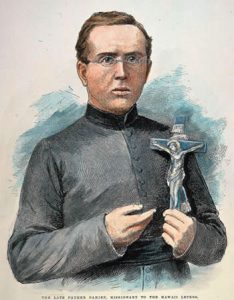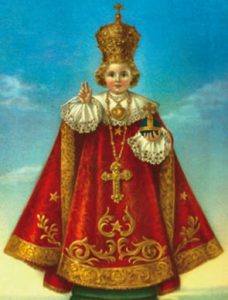May Saints
 Saint Damien de Veuster
Saint Damien de Veuster
(1840-1888)
Born Joseph de Veuster in Belgium in 1840, Damien was destined by his father for a commercial profession. But a Redemptorist mission changed all that, and at the age of 20 he took his religious vows with the Picpus Fathers, taking the name of Damien. At his request, he was sent as a missionary to Hawaii in 1864 and was ordained in Honolulu that same year.
For nine years he worked as a missionary in various parts of Hawaii and in 1873 he volunteered to become resident priest on the island of Molokai where the government kept segregated everyone afflicted with leprosy. At the time of his arrival, there were 600 lepers resident on the island. Food and clothing were supplied to these outcasts, but resident doctors and nurses were not available. No one wished to condemn him/herself to a horrible death – leprosy was considered highly contagious.
For a long time, Father Damien was the only one to bring them the help they so greatly needed. He not only administered the sacraments, but he also rendered them such little medical service as was within his power. He dressed their ulcers, regardless of the sight and smell of rotting flesh, helped them erect their cottages, and went so far as to dig their graves and make their coffins. Eventually, in 1885, he contracted the disease himself.
What gave him the strength to carry out this terrifying apostolate? His love for Jesus in the Eucharist. This love was transmitted to the lepers through the beautiful liturgies he organised, frequent Benedictions and Eucharistic processions. He set up numerous adoration chapels around the island and established perpetual Eucharistic adoration. In 1888 he wrote to his provincial, “This is the fifteenth year we observe night adoration … all of us lepers.” He wrote to his brother, “Without the constant presence of our Divine Master, I would never be able to cast my lot with that of the lepers.”
Saint Damien, help us to see Jesus in even the most repulsive of human beings.
(Source: Internet – various)
Daughter of a pagan Irish chieftain named Damon, her mother, a beautiful devoted Christian, died when Dymphna was a teenager. Her father searched for a woman to replace his wife, but none could. Returning home, he saw that his daughter was as beautiful as her mother, and maddened by grief, he made advances on her. She fought him off, then fled to Belgium with Saint Gerebernus, an elderly priest and family friend.
Dymphna’s father searched for them, and came to Belgium. There an innkeeper refused to accept his money, knowing it was difficult to exchange. This told Damon that his daughter was close. The king concentrated his search in the area. When he found them in Gheel, he beheaded Gerebernus, and demanded that Dymphna surrender to him. She refused, and he killed her in a rage.
The site where she died is known for its miraculous healings of the insane and possessed.
Saint Dymphna, give us the strength to support those with mental illness.
(Source: http://catholicsaints.info/saint-dymphna)
The original statue of Jesus, Infant and King, is carved from wood and covered with wax. It stands 18 inches high and is mounted on a pedestal in the Church of Our Lady of Victory in Prague, Czechoslovakia, where it has been venerated since 1628.
The left hand holds a miniature globe of the world surmounted by a cross. The right hand is raised in a pontifical blessing. It represents the Holy Childhood of Jesus, as well as His eternal Kingship.
Its origin is shrouded in legend, but it is known that it was brought from Spain to Prague in 1556 where it was presented to the Discalced Carmelite Sisters.
For a time it was mutilated and lost but was eventually recovered and restored to its original condition. It became the object of popular devotion which received Church approval when the statue was crowned by the Bishop of Prague on 4 April 1655 and the devotion was enriched with indulgences.
The Infant’s patronage is especially sought for vocations, health, financial well-being, good family life, schools, the welfare of children, freedom and peace, the missions and safety in travel.
The many miracles attributed to the Infant of Prague have helped spread the devotion throughout the world even to this day.
Holy Infant of Prague, give us a childlike trust in God.
(Source: http://www.catholictradition.org/Children/infant-prague.htm)


 Entries(RSS)
Entries(RSS)